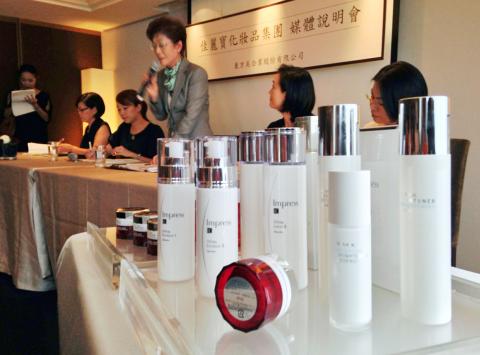Tung Fang Mei Enterprise Co Ltd (東方美), the local agent for Japanese cosmetics brand Kanebo, said it has taken 12 products off the nation’s shelves after Kanebo announced a recall yesterday.
Kanebo recalled 54 skin-whitening products across Asia after complaints they caused discoloring that does not clear up even after use of the products was discontinued.
The products contain a substance called Rhododendrol, or 4HPB, a synthetic version of a natural compound that the firm developed, Kanebo said.

Photo: CNA
Taiwan is the largest overseas market for the products, a Kanebo spokesman in Japan told Agence France-Presse (AFP).
Consumers in Taiwan who have bought the 12 products can return them in exchange for other products until Aug. 10, Tung Fang Mei said in a statement.
It said that sales of the product were being suspended only to allay customer concerns and not because the products were problematic.
Questions have not been raised about the ingredient in any market except Japan, the statement said.
“Some consumers complained that they had white patches on their skin after using the products, and we suspect a link between the condition and 4HPB,” a Kanebo spokeswoman in Japan said.
Taiwan’s Department of Health said there have been no reports of irritation from consumers.
Major department store chains — Pacific Sogo Department Stores Co (太平洋崇光百貨), Shin Kong Mitsukoshi Department Store Co (新光三越百貨), and Far Eastern Department Stores Co (遠東百貨) — have said they will help customers who want to return the 12 products.
A Kanebo company spokesman later told AFP the company had received 39 complaints from customers in Japan since May. Fifteen had shown no improvement in their conditions even after they stopped using the products, he said.
“The problem was initially thought to be a type of skin disease, but there was a growing concern the condition could be linked to 4HPB,” which led the company to recall the products, the spokesman said.
The company has shipped a total of 4.36 million products in Japan and is recalling 450,000 that have already been sold, as well as all inventory from the Japanese market.
A total of 370,000 items have been sent to overseas markets, but at present Kanebo only plans to recall items that are on sale.
The sales suspended by Tung Fang Mei include products in the Blanchir Superior series — White Deep Clear Conditioner, White Deep Milky Conditioner and White Deep Night Conditioner — and those in the Impress series — Impress IC White Lotion, Impress IC White Emulsion, Impress IC White Fit Mask 3D and Impress Granmula Lotion.
The recall also covers Hong Kong, South Korea, Thailand, Singapore, Malaysia, Indonesia, Myanmar, the Philippines and Vietnam.

US President Donald Trump yesterday announced sweeping "reciprocal tariffs" on US trading partners, including a 32 percent tax on goods from Taiwan that is set to take effect on Wednesday. At a Rose Garden event, Trump declared a 10 percent baseline tax on imports from all countries, with the White House saying it would take effect on Saturday. Countries with larger trade surpluses with the US would face higher duties beginning on Wednesday, including Taiwan (32 percent), China (34 percent), Japan (24 percent), South Korea (25 percent), Vietnam (46 percent) and Thailand (36 percent). Canada and Mexico, the two largest US trading

AIR SUPPORT: The Ministry of National Defense thanked the US for the delivery, adding that it was an indicator of the White House’s commitment to the Taiwan Relations Act Deputy Minister of National Defense Po Horng-huei (柏鴻輝) and Representative to the US Alexander Yui on Friday attended a delivery ceremony for the first of Taiwan’s long-awaited 66 F-16C/D Block 70 jets at a Lockheed Martin Corp factory in Greenville, South Carolina. “We are so proud to be the global home of the F-16 and to support Taiwan’s air defense capabilities,” US Representative William Timmons wrote on X, alongside a photograph of Taiwanese and US officials at the event. The F-16C/D Block 70 jets Taiwan ordered have the same capabilities as aircraft that had been upgraded to F-16Vs. The batch of Lockheed Martin

GRIDLOCK: The National Fire Agency’s Special Search and Rescue team is on standby to travel to the countries to help out with the rescue effort A powerful earthquake rocked Myanmar and neighboring Thailand yesterday, killing at least three people in Bangkok and burying dozens when a high-rise building under construction collapsed. Footage shared on social media from Myanmar’s second-largest city showed widespread destruction, raising fears that many were trapped under the rubble or killed. The magnitude 7.7 earthquake, with an epicenter near Mandalay in Myanmar, struck at midday and was followed by a strong magnitude 6.4 aftershock. The extent of death, injury and destruction — especially in Myanmar, which is embroiled in a civil war and where information is tightly controlled at the best of times —

China's military today said it began joint army, navy and rocket force exercises around Taiwan to "serve as a stern warning and powerful deterrent against Taiwanese independence," calling President William Lai (賴清德) a "parasite." The exercises come after Lai called Beijing a "foreign hostile force" last month. More than 10 Chinese military ships approached close to Taiwan's 24 nautical mile (44.4km) contiguous zone this morning and Taiwan sent its own warships to respond, two senior Taiwanese officials said. Taiwan has not yet detected any live fire by the Chinese military so far, one of the officials said. The drills took place after US Secretary